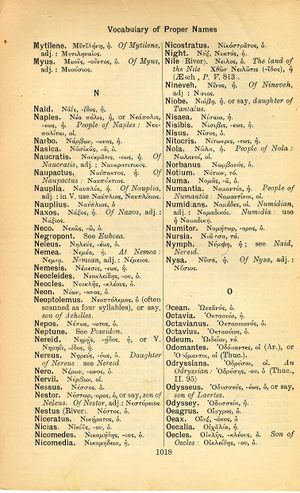Naxos
ἐν δὲ τοῖς φυσικοῖς ἀεὶ οὕτως, ἂν μή τι ἐμποδίσῃ → in natural products the sequence is invariable, if there is no impediment | now with that which is natural it is always thus if there is no impediment
English > Greek (Woodhouse)
Νάξος, ἡ.
Of Naxos, adj.: Νάξιος.
Latin > English (Lewis & Short)
Naxos: i, f., = Νάξος,
I the isle of Naxos (now Naxia, or Axia), in the Ægean Sea, the largest of the Cyclades, famed for its wines, and for the abandonment there of Ariadne by Theseus, Plin. 4, 12, 22, § 67; Verg. A. 3, 125; Ov. M. 3, 640; Prop. 3, 17 (4, 16), 27.— Hence, Naxĭus, a, um, adj., Naxian: turba, Prop. 3, 17 (4, 16), 28: juncus, Plin. 21, 18, 69, § 115: ardor, Ariadne's crown, a constellation, Col. 10, 52: cos, = Ναξία ἀκόνη, a whetstone from Naxos, Plin. 36, 22, 47, § 164. —Subst.: naxĭum, ii, n., a Naxian whetstone, Plin. 36, 7, 10, § 54; 37, 8, 32, § 109.—
II An ancient city of Sicily, destroyed by Dionysius. On or near its site Tauromenium was built, Plin. 3, 8, 14, § 88.

